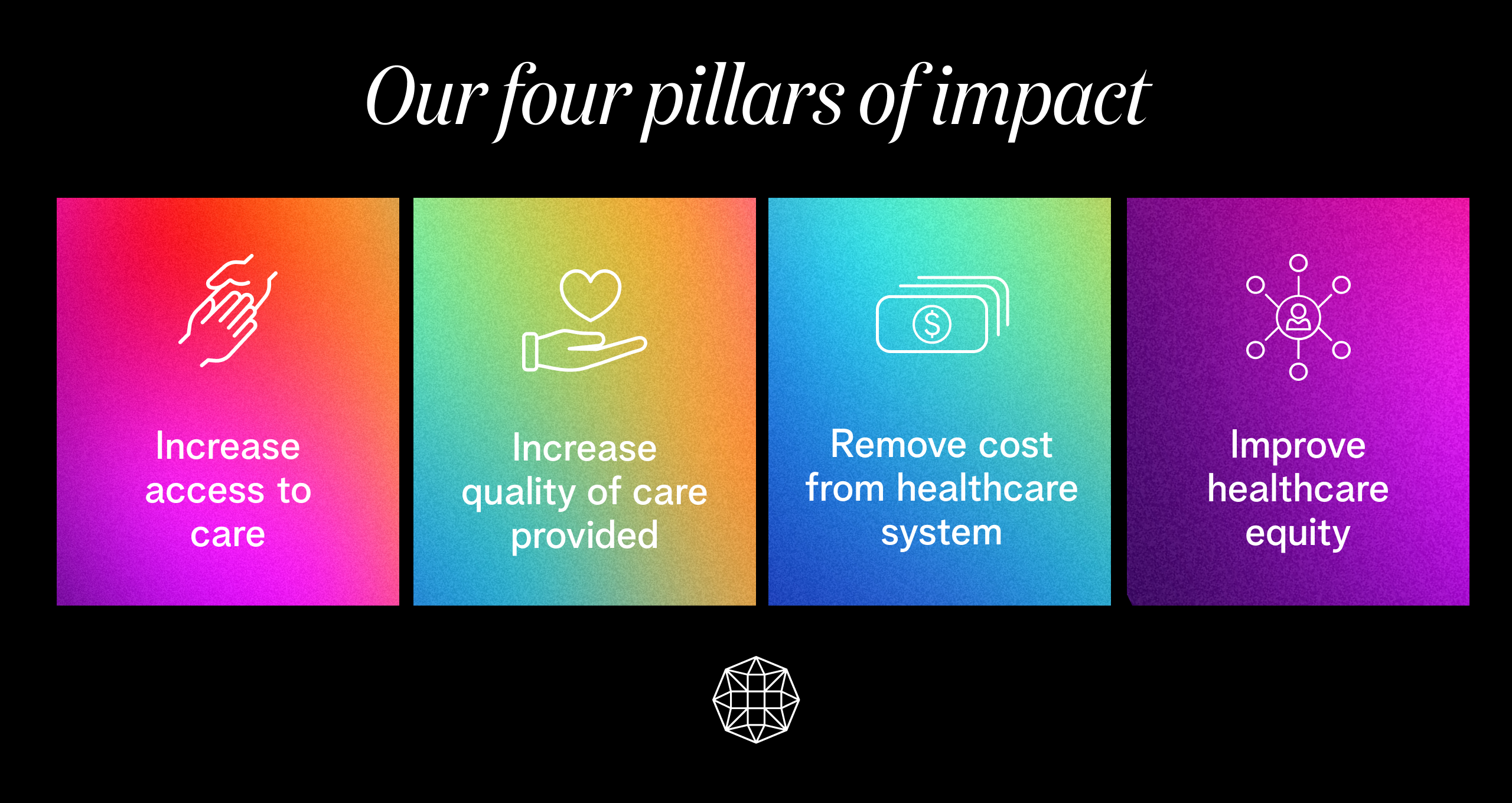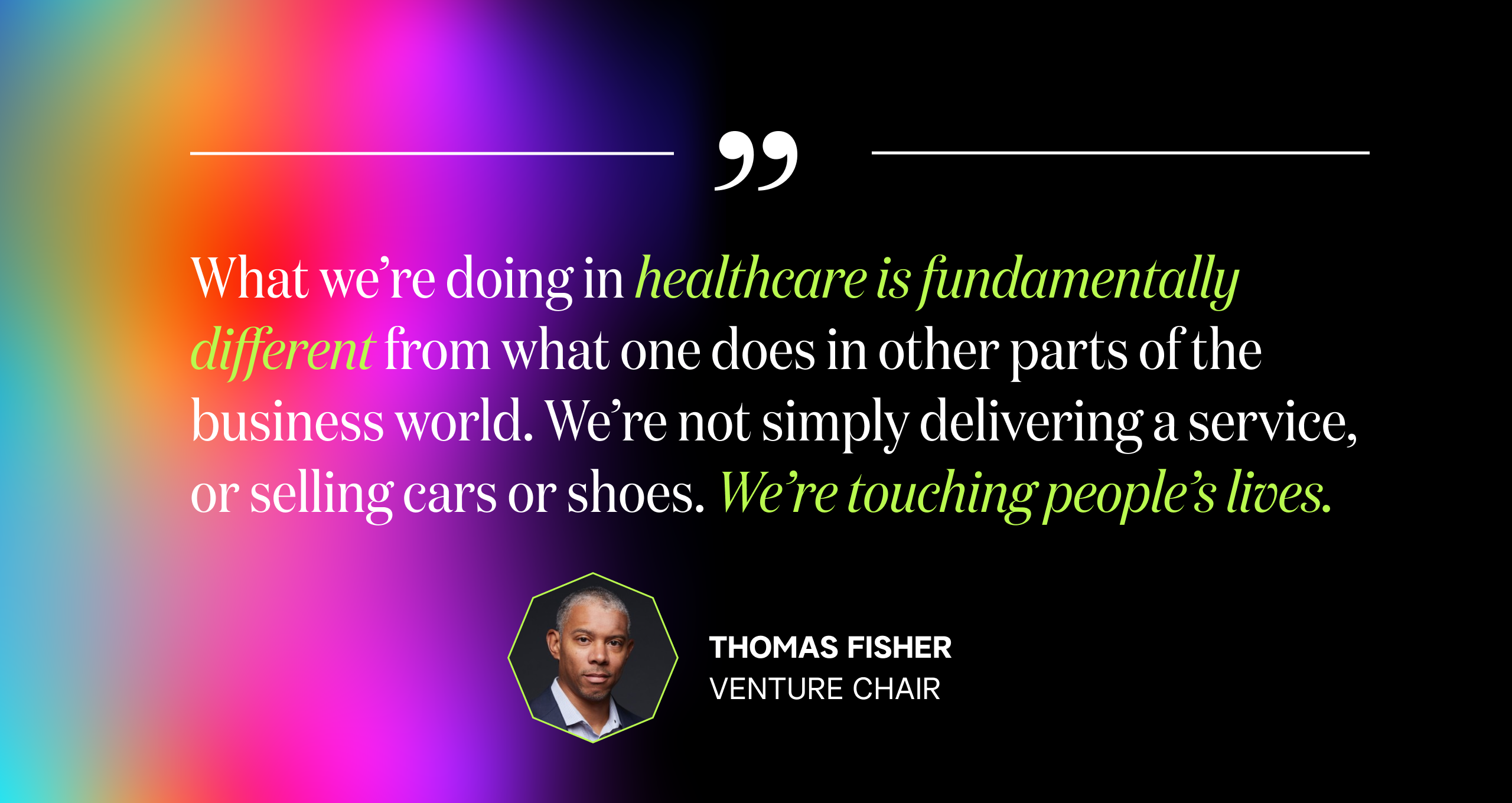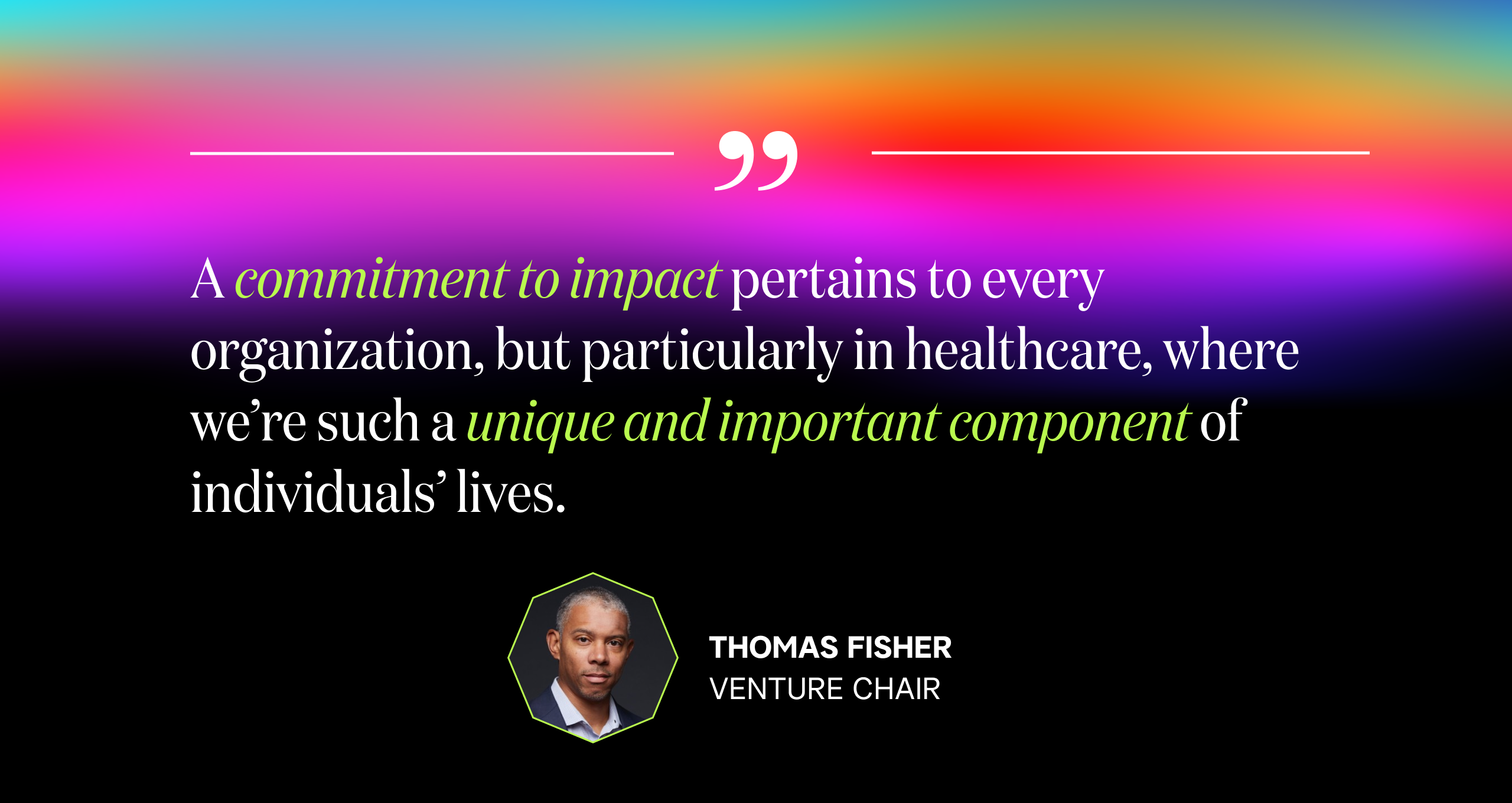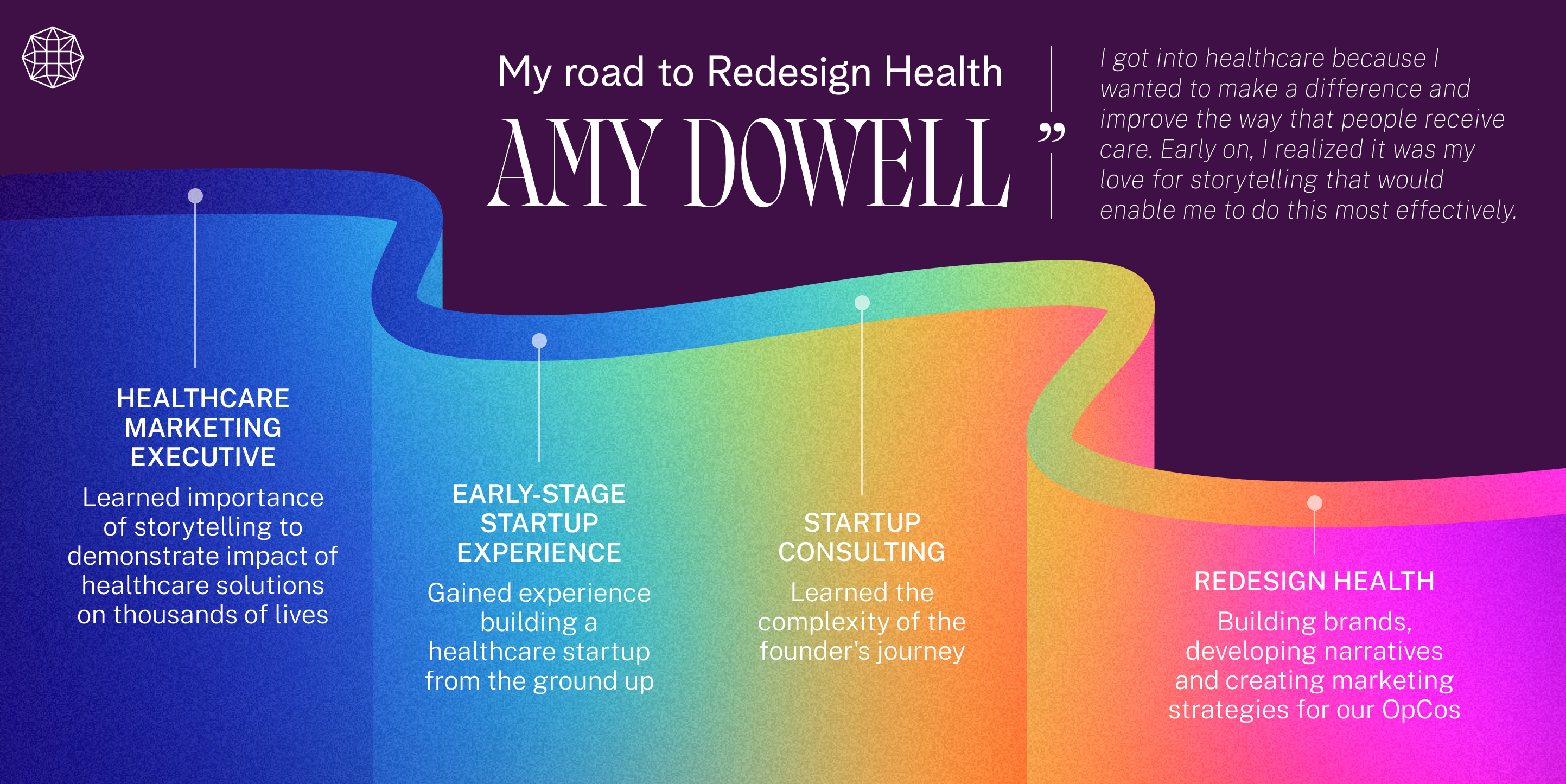
How Redesign Health Stays Focused on Impact: A Q&A with Thomas Fisher, MD
Redesign Health launched in 2018 with a clear purpose: creating a new model for innovation in healthcare. A few short years later, that model has made an extraordinary impact. We’ve built more than 50 healthcare companies from the ground up, delivering new solutions for some of the industry’s most difficult problems.
Throughout this journey, we’ve never believed in change for change’s sake. With growth comes a responsibility to ensure that we’re changing lives — and the healthcare system — for the better. That’s why we’ve established a framework to align our businesses around tangible impact.

Redesign Health’s four pillars of impact
Our impact framework has four pillars that broadly coincide with important shifts taking place across our industry:
Increasing access to care
Increasing the quality of care provided
Removing cost from the healthcare system
Improving healthcare equity
These four pillars shape everything we do–from vetting new business concepts to launching and scaling all of our operating companies. For example, any business that receives funding from Redesign Health must be able to improve at least one of these criteria without hindering the others.
We’re not alone in this endeavor. These four pillars hew closely to standard measurements used by bellwether organizations like the U.S. Department of Health and Human Services and the Global Impact Investing Network, along with the mission statements of industry leaders such as CMS and the American Medical Association. Our impact framework keeps us at the leading edge of the industry and provides directional guidance for our team as we scale.
We sat down with Thomas Fisher, Venture Chair at Redesign Health and a practicing emergency medicine physician, to discuss how the impact framework guides our efforts to redesign healthcare.

Thomas Fisher, MD, MPH
Redesign Health Venture Chair
You’re both a physician and a company builder. Why does a focus on impact matter when building healthcare companies?
Thomas Fisher: The American healthcare system has always struggled to create affordable, high-quality care that avoids waste and ultimately delivers what’s required: the resources and tools that help people stay healthy or get healthy.
What we’re doing in healthcare is fundamentally different from what one does in other parts of the business world. We’re not simply delivering a service, or selling cars or shoes. We’re touching people’s lives. It’s important for us to have a meaningful grounding in the sort of impact we want to make, so that when things get murky, we have clarity on how to make decisions.
As a healthcare provider, I take care of people on their worst days. I don’t always have the power to control whether they recover, but I do have the power to decide how I engage them and the tools and resources I use. Am I providing evidence-based practice? Am I being humane? Am I being efficient?
If I do those things, at the end of the day, I can look in the mirror and say that I’m on the right side of healthcare and humanity. We bring this same mindset to the way we build our businesses. While we may not be able to choose the outcome, we can choose our approach.

Why those four pillars, and how were they chosen? How do they align with how others in healthcare think about impact?
Fisher: We didn’t make these pillars up: These are prevailing themes that various sectors of our healthcare system have been working on. In many ways, we’re drafting behind the work that’s already been done.
The first three pillars — access, quality and reducing costs — are longstanding. We’ve known for quite some time that many people do not have enough access to the care they need in the manner that makes sense for them. We also know that despite our best efforts to design and provide quality care, many people do not experience ideal outcomes, and some are harmed. And we know that the cost of healthcare is spiraling, now consuming almost 20% of our GDP. That’s unsustainable.
We’ve been working on these things since I became a doctor over 20 years ago, and we’ve made halting progress, with fits and starts. We’ve seen great examples in some places, but not in others.
One of the common themes we’ve identified that’s been holding progress back is inequity–meaning that we’re only able to give quality care to some people, sometimes. That’s where our fourth pillar, improving equity, comes from.
Bodies such as the American Hospital Association, the AMA, AHIP (formerly America’s Health Insurance Plans) and CMS have all identified these pillars as the four things we need to tackle to move the body of healthcare forward.
What’s exciting is that these areas can often influence one another in unintended ways. If you get this right, you can really quickly improve healthcare.
What areas of impact are not yet represented here?
Fisher: I’d add “provider experience” to the list. You can easily wrap that into quality and access, because to the extent that you make the experience better for a provider, they can deliver better care.
During the pandemic, we wore out a generation of nurses, pharmacists, doctors and other healthcare professionals who were at the front lines delivering care to people who needed it the most. What if we figured out ways to make their lives better? What if we didn’t have to replace them every fifth year—or every fifth month, in the case of nurses?
At the end of the day, everybody gets sick. Everybody needs care. We should think about how we can improve the experience where the rubber meets the road.
Is there a tension between running a successful business and prioritizing impact?
Fisher: I think of it less as tension and more as the progress over the course of a company’s development. When they’re just getting started, learning to walk, they have to focus on the smallest practicalities, learning how to walk. As a new business, you have to get into the market and demonstrate that you can interact with a patient in the right way and achieve the outcome that you want.
Our companies are only young for a little while. At some point, they’re going to grow big and durable. Instead of retrofitting a perspective, we’re incorporating impact into the organization’s DNA.
Our impact pillars serve as “North Stars” to help companies as they pivot and create fit, to ensure that the outcome they’re delivering is making things better, not worse. We simply do not want to say, “Well, I’d love to do the right thing, but it’s too expensive.”
At Redesign, we’ve committed to helping our operating companies be thoughtful about cost, quality, equity and access. Our new business team uses these metrics to categorize companies and ensure that they’re delivering against these pillars. We’ll be measuring them in our environmental, social and governance (ESG) program, speaking to them in the course of CEO hiring, and using them to evaluate the trajectory of our companies.
During the company creation process, the team decides: What goals are we going to achieve? How will we go to market in a way that ensures we’re delivering? These become operational business requirements, and they use data to monitor these goals — just as they use data to monitor their cash burn, engagement rates and so on. These are business processes that are being expanded and refined for the 21st century.
What’s exciting in healthcare is that doing the right thing will drive your business outcomes. To the extent that you’re making care better, you will acquire more customers.

Is this type of commitment only relevant to healthcare, or is it something that you’d recommend for all companies?
Fisher: This is a really interesting and existential question! Why are we here? The answers not only translate into our everyday choices about how we spend our time, but also ladder up into how we come together to achieve an outcome.
Working in a way that’s clearly linked to values matters no matter what you’re doing. A commitment to impact pertains to every organization, but particularly in healthcare, where we’re such a unique and important component of individuals’ lives.

Thomas Fisher is a physician executive with 20 years of health care transformation experience. Most recently he advised startups, venture capital and government agencies through Headwaters Consulting LLC. Thomas is a former health insurance executive who scaled NextLevel Health, a Medicaid MCO through 85K members and prepared Blue Cross and Blue Shield plans in five states for ACA implementation as an executive at HCSC. Previously Thomas drove ACA regulations and the HHS Action Plan for Reducing Racial and Ethnic Health Disparities while a White House Fellow at the U.S. Department of Health and Human Services in the first term of the Obama Administration. His path includes training as a Robert Wood Johnson Clinical Scholar, being honored as a Crain’s Chicago Business 40 under 40 and fellowing in the Aspen Health Innovators Fellowship. He is an holds an AB from Dartmouth College, MPH from Harvard University, and an MD from the University of Chicago. Dr. Fisher continues to care for patients in the emergency department at the University of Chicago.
![No alternate text]() Redesign HealthWelcoming Joseph Jasser as Our Newest Venture Chair
Redesign HealthWelcoming Joseph Jasser as Our Newest Venture ChairAccomplished healthcare executive will join the board of two Redesign Health Operating Companies
July 18, 2024
![No alternate text]() Redesign HealthIntroducing Patrick Gilligan, Our Newest Venture Chair
Redesign HealthIntroducing Patrick Gilligan, Our Newest Venture ChairA trailblazer in value-based care and digital health, Gilligan brings diverse expertise to his new role
July 12, 2024
![No alternate text]() Redesign HealthMeet Linda Nash, Our Newest Venture Chair
Redesign HealthMeet Linda Nash, Our Newest Venture ChairA pioneer in concierge medicine, Linda brings unique insights and expertise to the Redesign Health ecosystem.
May 29, 2024
![No alternate text]() ImpactRedesign HealthHow Redesign Health Stays Focused on Impact: A Q&A with Thomas Fisher, MD
ImpactRedesign HealthHow Redesign Health Stays Focused on Impact: A Q&A with Thomas Fisher, MDVenture Chair Thomas Fisher discusses how the Redesign Health impact framework guides our efforts to redesign healthcare.
July 13, 2023
![No alternate text]() TALENT ACQUISITIONBrenda Schmidt: From Healthcare CEO to Innovation Leader
TALENT ACQUISITIONBrenda Schmidt: From Healthcare CEO to Innovation LeaderBrenda Schmidt, Head of Enterprise Growth, shares how her background as an entrepreneur led to her perfect career match at Redesign Health.
May 04, 2023
![No alternate text]() PeopleAmy Dowell: Using The Power of Empathy and Storytelling, My Road to Powering Community in Healthcare
PeopleAmy Dowell: Using The Power of Empathy and Storytelling, My Road to Powering Community in HealthcareAmy Dowell, Vice President of Marketing, reflects on her career journey and how her unique experience contributes to powering community at Redesign Health.
January 26, 2023
![No alternate text]() CEOUnexpected Learnings from Healthcare Leaders
CEOUnexpected Learnings from Healthcare LeadersWe’ve asked a few leaders to share insights and lessons learned while building businesses across the healthcare ecosystem.
December 06, 2022
![No alternate text]() InnovationMissy Krasner: Aligning Incentives to Accelerate Change
InnovationMissy Krasner: Aligning Incentives to Accelerate ChangeWe recently spoke with Redesign Health Venture Chair, Missy Krasner, to share her experience building next-generation healthcare solutions at scale. The Redesign Health team is growing. Come join us!
September 22, 2022
![No alternate text]() InternshipReflections From Tomorrow’s Leaders: The Summer 2022 Class of Redesign Health Interns
InternshipReflections From Tomorrow’s Leaders: The Summer 2022 Class of Redesign Health InternsWe asked a few of this summer’s Redesign Health Interns to reflect on their experience of helping build high-quality health solutions at scale. Here’s what they had to say:
September 01, 2022
![No alternate text]() Talent AcquisitionScaling Empathy in Cancer Care with Adam Pellegrini, CEO & Co-Founder of Jasper Health
Talent AcquisitionScaling Empathy in Cancer Care with Adam Pellegrini, CEO & Co-Founder of Jasper HealthWe sat down with Adam Pellegrini, CEO & Co-Founder of Jasper Health, a digital oncology platform built at Redesign Health, which delivers personalized psychosocial support and coaching directly to members via a hybrid, patient-centric approach.
August 18, 2022
![No alternate text]() CEOLeadership Lessons from CEOs of Healthcare Companies
CEOLeadership Lessons from CEOs of Healthcare CompaniesEach Operating Company built at Redesign Health is led by a CEO who sets the vision for the company and defines the overall strategy from launch to scale.
August 03, 2022
![No alternate text]() InnovationKira Wampler: Driving Change in Healthcare Through Curiosity and Ambition
InnovationKira Wampler: Driving Change in Healthcare Through Curiosity and AmbitionWe spoke with our lead Venture Chair, Kira Wampler, to share her perspective on how Redesign Health is fundamentally changing the care equation by powering innovation at scale.
July 27, 2022
![No alternate text]() Patient ExperienceRemoving Barriers to Quality Physical Therapy Care with Kins CEO Dan Smith
Patient ExperienceRemoving Barriers to Quality Physical Therapy Care with Kins CEO Dan SmithWe welcome Dan Smith, co-founder and CEO of Kins, a company that’s modernizing physical therapy by combining the best of in-person care with the power of digital.
July 20, 2022
![No alternate text]() Talent Acquisition10 Questions with Jon Cooper, CEO of Overalls
Talent Acquisition10 Questions with Jon Cooper, CEO of OverallsAs part of our “10 Questions with Redesign Health CEOs” series, we welcome Jon Cooper, Co-Founder, and CEO of Overalls.
June 09, 2022
![No alternate text]() Talent Acquisition10 Questions with Amy Shecter, CEO of Ever/Body
Talent Acquisition10 Questions with Amy Shecter, CEO of Ever/BodyAs part of our “10 Questions with CEOs” series, we welcome Amy Shecter, CEO of Ever/Body, a company that works to demystify cosmetic dermatology and make it more accessible.
May 18, 2022
![No alternate text]() Talent Acquisition10 Questions with Kyle Talcott, CEO of UpLift
Talent Acquisition10 Questions with Kyle Talcott, CEO of UpLiftWelcome to our first post from the “10 Questions with Redesign Health CEOs” series, where we talk to CEOs of companies built at Redesign Health to learn about their experience building and scaling a healthcare business.
April 20, 2022
![No alternate text]() Talent AcquisitionTara Alvarez: My Three Favorite Things About Working at Redesign Health
Talent AcquisitionTara Alvarez: My Three Favorite Things About Working at Redesign HealthAs part of our “My Three Favorite Things About Working at Redesign Health” series, we welcome our VP of Talent Acquisition, Tara Alvarez, to share her experience cultivating Redesign Health’s team of driven innovators.
April 19, 2022
















